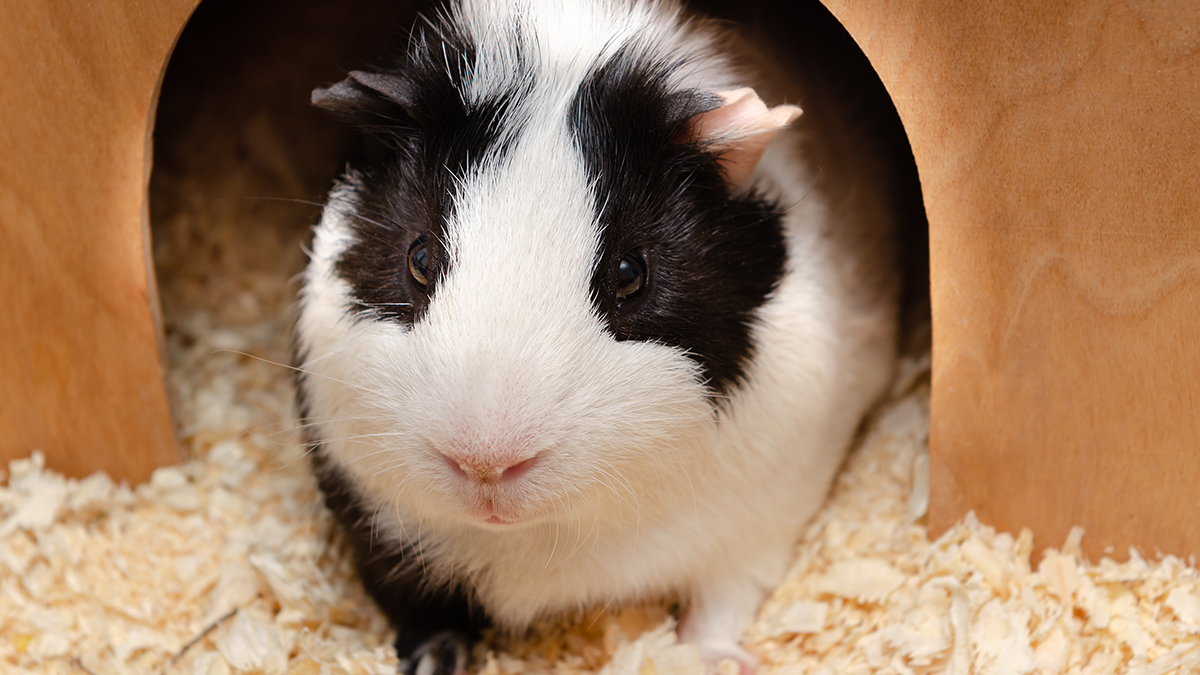
Species Overview
- Common Names: Guinea pig, cavy, domestic cavy
- Scientific Name: Cavia porcellus
- Adult Size: Approximately 10 inches long, weighing 2 to 3 pounds
- Life Expectancy: Five to seven years; some live up to 10 years
There are several varieties of guinea pigs with different coat types and color patterns. The most common are the American (short, smooth coat), Abyssinian (short coat with swirls called rosettes), and Peruvian (long coat).
As pets, guinea pigs are typically friendly and docile. Their care is moderately time-consuming but straightforward. Their housing is relatively easy to set up and maintain, and their diets are readily available.
About the Guinea Pig
Guinea Pig Care: Habitat Set-Up
- The best size cage for your guinea pig is as large as you can afford. Generally, for a single guinea pig, a cage of about 30 inches by 36 inches by 18 inches tall is excellent. For two guinea pigs, get a pen at least 30 inches by 50 inches by 18 inches tall.
- Wire cages work best and have excellent ventilation. One of the best options is a cage with a plastic base and a wire top. Add a 2-inch layer of bedding at the bottom. Avoid cedar and pine bedding, which can irritate a guinea pig’s respiratory system. Also, add a small animal hideout or nest, where your guinea pig can go to feel secure and rest. And add some guinea pig toys for chewing and play.
- Place the cage in a relatively quiet part of your home. Loud noises and sudden movements can easily stress a guinea pig. Also, make sure the pen is out of direct sunlight and away from drafts.
Guinea Pig Care: Temperament
- Guinea pigs are social animals. Keeping them in same-sex pairs to prevent loneliness and boredom works well. A couple of females is the better option, as two males will sometimes fight. To ensure your guinea pig stays safe, keep them away from your other household pets, like dogs and cats.
- Your pet guinea pigs might be nervous at first, but they rarely bite. With frequent handling, they generally become very tame and comfortable being picked up and carried around. While they’re usually quiet pets, guinea pigs can make loud noises. A squealing noise occurs when they’re excited about a meal, or sometimes they make purring sounds when they’re relaxed.
- Guinea pigs have a range of personalities, from shy to outgoing. In general, they are gentle and affectionate pets, and many enjoy cuddling with their owners.
- Guinea pigs are typically active during the day, and they occasionally wake up and move around at night.
- Please plan to spend at least a few hours per day, giving your pet attention out of its enclosure, and allowing it to exercise and explore. And in addition to daily feedings, expect to clean the pen at least once a week.
Guinea Pig Care: Diet and Nutrition
- Guinea pigs are herbivores, meaning they eat plants. Offer your guinea pig an unlimited amount of timothy hay every day. Make sure some timothy hay is always available. This aids digestion and helps to wear down their teeth, which grow continuously.
- Select a pelleted food formulated for guinea pigs to feed each day. The pellets should be fortified with vitamin C, as guinea pigs cannot produce this vitamin on their own. Follow the package instructions for how much to feed. Use heavy ceramic food dishes since they are harder to tip over than a plate or lightweight bowl.
- To supplement the hay and pellets, offer a variety of fresh fruits and vegetables each day in another small bowl separate from the pellet food. Supplemented foods should not exceed 10% of the total daily diet. Some good options include romaine lettuce, kale, and cilantro, as well as carrots, zucchini, kiwi, and blueberries.
- For treats, you can give sugary fruits. But keep the sweet fruit to a minimum, only offering it a few times a week.
- Always provide a clean source of water for your Guniea pig, and refresh it daily. Cage water bottles work well because they are easy to keep clean and sanitary. You can also use a shallow dish for water until your guinea pig learns to drink from the bottle.
Healthcare
As part of their care, guinea pigs need regular grooming at least weekly (or more often for longhaired guinea pigs). Brush out any mats and loose fur. Also, clip your guinea pig’s nails monthly, or they can become overgrown and affect the animal’s ability to walk.
Pet Safety
- Use caution when handling pets and remember they may bite or scratch (especially when stressed).
- Supervise children around pets.
- ALL ANIMALS can potentially carry viral, bacterial, fungal, and parasitic diseases contagious to humans.
- Thoroughly wash your hands with warm, soapy water before and after contact with any pet or its habitat.
- Adults should assist children with handwashing after contact with a pet, its habitat, or aquarium water.
Related Searches
Small Animal Care